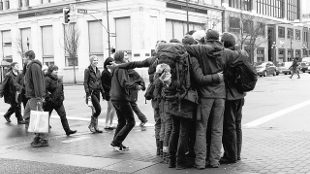 FLICKR, JORIS LOUWESAnalyzing the genetic differences among nearly 2,000 people, James Fowler of the University of California, San Diego, and Yale University’s Nicholas Christakis found that friends shared about 0.1 percent more DNA than the average stranger—a level of genetic similarity expected among fourth cousins.
FLICKR, JORIS LOUWESAnalyzing the genetic differences among nearly 2,000 people, James Fowler of the University of California, San Diego, and Yale University’s Nicholas Christakis found that friends shared about 0.1 percent more DNA than the average stranger—a level of genetic similarity expected among fourth cousins.
“Most people don’t even know who their fourth cousins are,” Christakis told BBC News. “Yet we are somehow, among a myriad of possibilities, managing to select as friends the people who resemble our kin.”
“It’s obvious that humans tend to associate with other people who are very similar to themselves,” Matthew Jackson, a professor of economics at Stanford University who studies social networks, told NPR. “This gives us evidence that it’s operating not just at a level of very obvious characteristics but also ones that might be more subtle—things that that we hadn’t really anticipated.”
The data were collected as part of the Framingham Heart Study. “Because the study started in a small community, many people that were named as friends, also happened to be ...





















